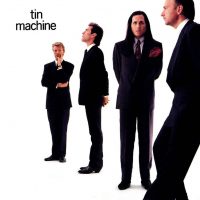 Written by: David Bowie, Reeves Gabrels
Written by: David Bowie, Reeves Gabrels
Recorded: August – October 1988; February – April 1989
Producers: Tin Machine, Tim Palmer
Engineer: Justin Shirley-Smith
Released: 22 May 1989
Available on:
Tin Machine
Personnel
David Bowie: vocals, guitar
Reeves Gabrels, Kevin Armstrong: guitar
Tony Sales: bass guitar, vocals
Hunt Sales: drums, vocals
Recorded for the first Tin Machine album, ‘Bus Stop’ was one of the earliest songs written by David Bowie and Reeves Gabrels, prior to the band’s formation.
In May 1988 Gabrels flew to Switzerland to begin working with Bowie. He stayed for a month, primarily working on a reimagining of ‘Look Back In Anger’ for a choreographed performance at London’s Institute of Contemporary Art in July.
If there was a plan, it was that David just wanted to make the music that he wanted to make. One cool thing was that we were listening to all the same stuff: Led Zeppelin bootlegs, Cream bootlegs, Hendrix bootlegs, Miles Davis’ Bitches Brew, Coltrane, the Pixies, Sonic Youth, Glen Branca, Stravinsky, John Lee Hooker, Buddy Guy, Junior Wells and Muddy Waters. Put all that in a blender and you got Tin Machine.
Starman, Paul Trynka
They also began work on several songs which would later be recorded by Tin Machine.
When it came to the guitar parts, we thought about them in terms of architecture – Gothic spirals of sound. This is where the art-school background really helps, because we rarely speak in musical terms. He and I were writing part of the songs that would go on to become Tin Machine songs – ‘Heaven’s In Here’, ‘Baby Universal’ (we had a rough version of that without vocals), ‘Baby Can Dance’, ‘Bus Stop’.
Strange Fascination, David Buckley
The song’s lyrics, a brief vignette about a man who finds Jesus at a bus stop, brought a moment of levity to the often dour Tin Machine album. The pen portrait of city life brought to mind some of Bowie’s earliest songwriting styles, although in 1967 he never managed lines like “I’m not saying that I don’t believe you/But are you sure that it really was him?/I’ve been told that it could’ve been blue cheese/Or the meal that we ate down the road”.
One song, ‘Bus Stop’, you sing in a very English accent. Why has your singing accent always changed so much?Bowie: The song felt so English. It’s almost vaudeville. I don’t know if the others feel very American or whatever by comparison but that felt very English.
Do you still feel English?
Bowie: Well I spend so little time there. I haven’t really been in England since 1973. I don’t really know much about it. I go in there once a year or, actually, sometimes not at all. When I was living in Berlin I wasn’t going into England at all. I stayed in Berlin for two and half years without moving out. I mean, my present day knowledge of England is based entirely on what I read. But in terms of atmosphere it’s just a blast every time I go in for three or four weeks.
Does it get sepia-tinted? Good old Blighty.
Bowie: Not really.
Do you miss the humour?
Bowie: Yes. (Stony faced). That’s something that stays with you. Always. (laughs).
Lasting just 1:44, ‘Bus Stop’ is the only sub-two minute song on Tin Machine. Indeed, it is the shortest piece of music the band ever released.
During their 1989 tour, ‘Bus Stop’ was given a country and western makeover; a recording from La Cigale, Paris, on 25 June 1989 was released on the ‘Tin Machine’ single in September 1989.
The Paris version was a bonus track on the 1995 Virgin Records reissue of Tin Machine. It was retitled ‘Country Bus Stop’ on the release, and for the 2007 digital download.


